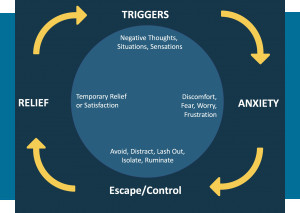
Anxiety and Stress
What are they?
Until fairly recently, life for human beings was considered “nasty, brutish, and short.” Predators abounded. Danger lied around every corner. Life was a constant struggle for survival. Your life depended on instincts and reflexes learned over thousands of years of evolution, and the moment you didn’t respond rapidly to a threat might have been your last. If this all sounds anxiety producing – that’s because it was!
The good news is we humans no longer live in such a world. For most twenty-first century inhabitants, survival is no longer our most pressing concern. The bad news is that most of us still react as if we live in a world in which danger is around every corner. Anxiety can turn anything…a test, a date, making a decision, into a perceived life-threatening situation in which we feel like our survival is at stake. We are hard-wired to survive, but not to thrive. The result… we’re often miserable and stressed due to anxiety.
Individuals struggling with anxiety often have recurrent thoughts such as:
– “What if…”
– “I can’t handle…”
– “Worse-case scenario”
– “Need to know”

Which trigger uncomfortable feelings like:
-Worry -Shame
-Fear -Helplessness
-Anger -Embarrassment
Common responses to these experiences include:
-Avoiding uncomfortable situations or taking “risks”
-Seeking reassurance from others
-Increased time on electronics
-Isolation
-Substance abuse
-Controlling others and the environment
You can learn about how we treat anxiety here.
What is Stress?
The “stress response” becomes activated when we are faced with urgent challenges or demands (like meeting a deadline for work or school), or actual and immediate threats to our safety. When the stress response is activated, it mobilizes the body to take necessary action to overcome challenges, demands, or ensure our safety from threats. Anxiety activates the stress response.
Short-term stress states can be useful in boosting motivation and productivity to get things done. It also allows us to take the actions necessary to protect ourselves when faced with danger. However, chronic prolonged states of stress can lead to an array of sleep and health issues, increased anger and frustration, and limits our capacity for empathy, emotional connection, and joy.
“Our mission is to deliver individualized, patient-centered care driven by the belief that everyone can live authentic, meaningful, and resilient lives.”
The Anxiety Cycle
 Anxiety is both an innate and learned experience that is designed to protect us from perceived harm and threats. We all endure stressors and “triggers” in daily life such as deadlines, relationship conflict, worry about the future, failure…the list goes on. These triggers activate unpleasant emotional experiences including anger, worry, fear, shame, just to name a few. We are hardwired to try and “get rid of” or “control” these negative internal and external experiences in some way; often by avoiding, escaping, or engaging in another activity that makes us feel better.
Anxiety is both an innate and learned experience that is designed to protect us from perceived harm and threats. We all endure stressors and “triggers” in daily life such as deadlines, relationship conflict, worry about the future, failure…the list goes on. These triggers activate unpleasant emotional experiences including anger, worry, fear, shame, just to name a few. We are hardwired to try and “get rid of” or “control” these negative internal and external experiences in some way; often by avoiding, escaping, or engaging in another activity that makes us feel better.
Through trial and error, we learn what actions help us feel better and what actions leave us feeling uncomfortable and activated. However, the relief we obtain from escaping or controlling is temporary until the next trigger or stressor arises. At which time the cycle of attempting to escape or control unwanted, unpleasant internal and external experiences is perpetuated. Leaving us stuck in a never-ending cycle of avoiding things that make us feel bad or uncomfortable. Our tolerance for facing and enduring life stressors can quickly decline, leaving us vulnerable to feeling defeated and at the mercy of anxiety.

